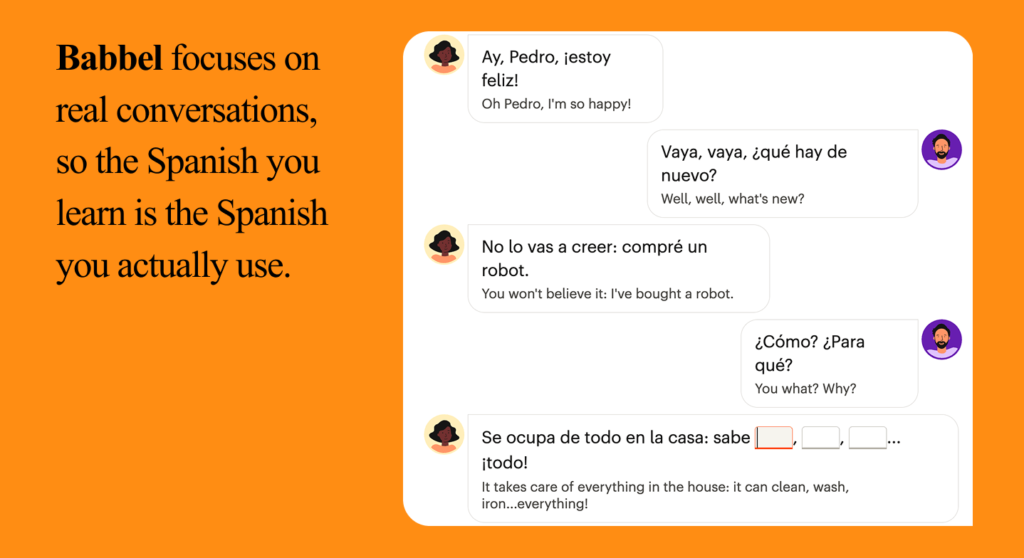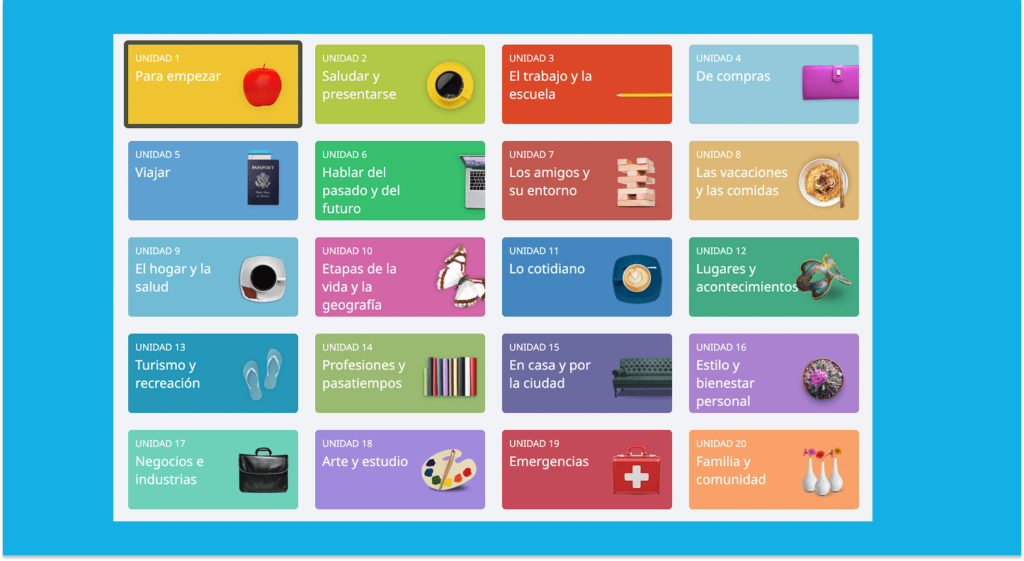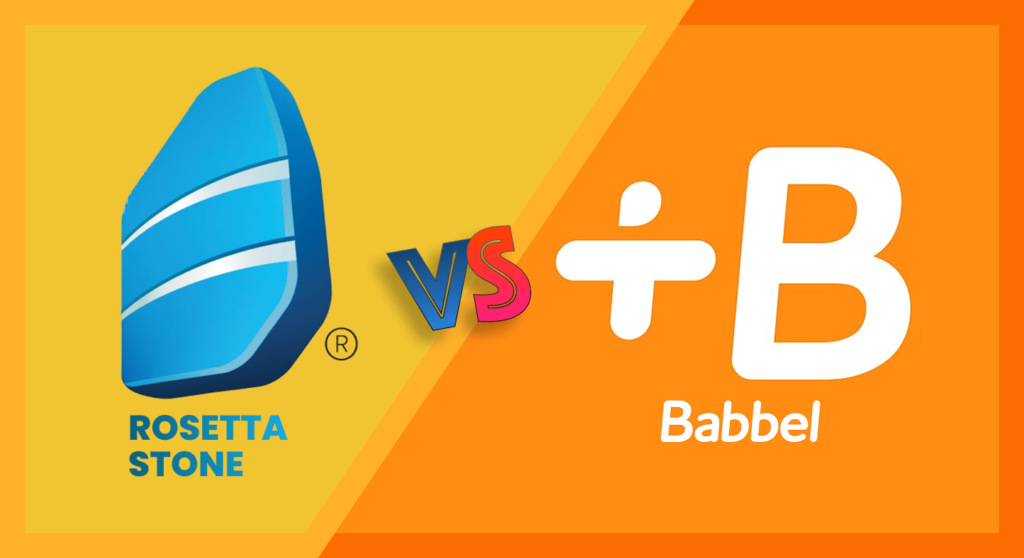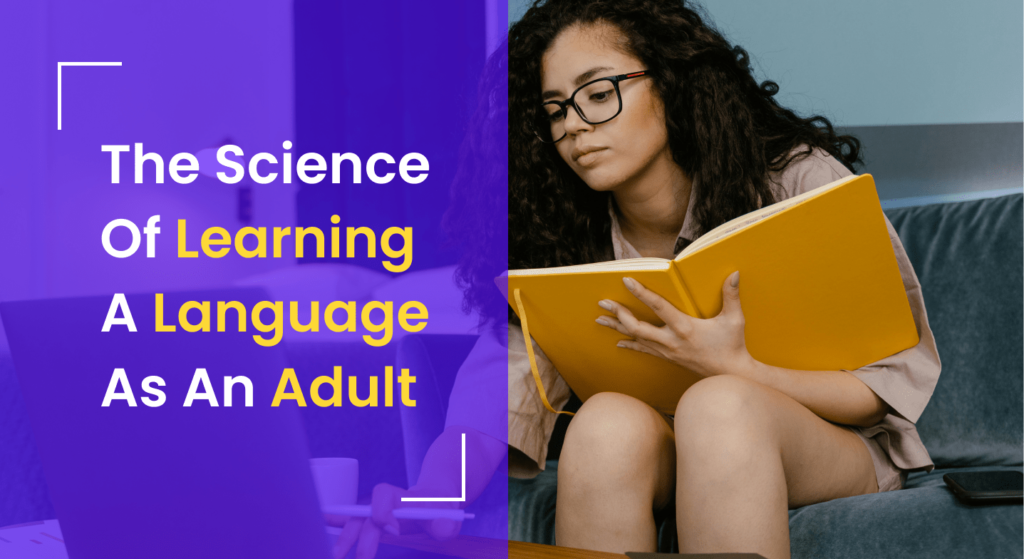When I first started learning Spanish, I wasn’t sure which app to go with—Babbel vs Rosetta Stone was the big question. I wanted something that would actually help me speak the language, not just memorize words or tap through exercises.
So I tried both.
I used Babbel and Rosetta Stone for months—really gave them a fair shot. I didn’t just test a few lessons; I followed the courses and used the apps as part of my routine while living in Madrid. Both have their strengths, but also a few things I wish I knew before getting started.
In this post, I’m sharing my honest experience with both apps and which one helped me make real progress with Spanish.
🛠️ Just want to test the apps for yourself? 💬 Want the full scoop before deciding?The Non-Negotiables of a Great Language App
Flashback to 2020—when I decided to move to Madrid and start a new life here, I downloaded a bunch of language apps hoping I’d be fluent in Spanish by the time I arrived. Fast forward to 2022, and I could barely express myself beyond the basics. You know, the typical “Hola,” “Me llamo…,” “Soy de…” kind of phrases. I couldn’t hold a conversation. I couldn’t even understand the locals.
Some apps kept me busy—I’ll give them that. They promised fluency, progress, all that. But in reality, all I got were digital medals and generic “Congrats!” screens after finishing a level. That’s why I’m sharing my personal checklist—what you should actually look for in a language app if you want real results, not just streaks and stars.
Babbel
One of the standout features Babbel offers is that the phrases are built around everyday conversations. If you’re a beginner, you’ll learn how to introduce yourself, ask simple questions, and as you move forward, you’ll get into real-world scenarios that are actually useful. The phrases taught from each lesson are something you’d say—or hear—in real-life Spanish conversations. I prefer this over memorizing weird lines—you’re learning how to talk like a person.
Rosetta Stone
Some sentences in Rosetta Stone are useful—but others just feel off. Like “This animal is from China. It does not speak Chinese.” I wish I was joking, but that’s a real one. Technically it’s correct, sure, but if I’m learning a language, I would want to pick up phrases I can use right away. Artificial phrases like those just make the lessons feel disconnected from real life, and it made it harder for me to use the language when I actually needed it.¡
Winner: Babbel
2. Do you want to actually remember what you learned a week, a month, or a year from now?Babbel
Babbel has a built-in review feature that reminds you to go over the vocab and phrases you’ve already learned. It uses SRS (spaced repetition system), which basically means it brings back words just before you’re about to forget them. Honestly, I’m kind of impressed with how well it works—I still remember a lot of the words I learned early on. It doesn’t just let things disappear. It keeps your brain active so stuff actually sticks.
Rosetta Stone
Rosetta Stone doesn’t use SRS, so once you finish a lesson, that’s kind of it—unless you go back and manually review it yourself. And let’s be real… who has time to build their own review system from scratch? Without reminders or spaced review, it’s easy to forget what you’ve learned, especially when you’re moving from one lesson to the next.
Winner: Babbel
3. Do you want a bit of grammar support, just enough to help you pick up language patterns?Babbel
Babbel gives short grammar explanations with each lesson. If you make a mistake, it shows you the rule you messed up on, so you can fix it right away. There’s even a grammar drill section if you want to practice specific rules that you’re struggling with. I know some people see grammar as an enemy, but for me, it just makes things clearer. It helps me spot patterns faster and understand what I’m reading or hearing. Babbel gives just enough grammar to make everything click—without making it feel like school.
Rosetta Stone
Rosetta Stone doesn’t explain grammar at all. That’s kind of the whole point of its method—you’re supposed to “absorb” grammar naturally through repetition. But the problem is: if you’re 25 or older (like me), that doesn’t work the same way anymore. Neuroscientists say adults can’t pick up a language passively the same way kids do, and I definitely know that by experience. Sometimes I’d get stuck on a phrase from a lesson and have zero clue why it was phrased that way. And without any explanation, it just felt like guesswork.
Winner: Babbel… But I find Babbel’s grammar lessons a bit basic—once you reach more advanced levels, you’ll need other resources.
4. Do you want to actually practice speaking, not just tap through lessons and move on?Babbel
Babbel gives you short speaking prompts during lessons, but it does not stop there it also has dedicated sections to help you practice. There´s the Guided Conversation, if you’re not confident building your own sentences yet—you’re given a script for a specific situation, and you practice saying each part like a dialogue. Then there’s the AI Conversation, which is more advanced. You’re given a scenario and you construct your own sentence freely in a back-and-forth exchange with the AI.
Rosetta Stone
Rosetta Stone gets you to repeat sentences and using speech recognition, it gives you pronunciation feedback. But that’s where it ends. It’s more about pronunciation and parroting than actual speaking and creating your own sentence.
Winner: Babbel
5. Do you want a clear learning path that shows real progress, not just random lessons with no direction?Babbel
Once you sign up, Babbel gives you a placement test to estimate your CEFR level (A1 to C1) and recommends where to start—so you’re not wasting time on stuff you already know. The lessons follow a logical sequence based on your level, and each one builds on the last. Grammar, vocabulary, and real-life phrases are all connected, so it´s not too easy or not too hard. You’re not just swiping through random topics—you’re following a path that actually makes sense. You can even retake the placement test later to track your progress.
Rosetta Stone
Rosetta Stone aslo follows the CEFR framework, and it has a placement test too to figure out your level. The course is split into levels from A1 to C1, and each level is broken into themed units—like daily life, travel, or work—so you’re not just jumping into random lessons.
Winner: Tie. Both apps actually have very well-structured CEFR lessons.
🧠 Not sure what CEFR levels mean?
Check out The Ultimate CEFR Language Levels Guide: What Adult Spanish Learners Need to Know
Babbel
Babbel has some light motivational features—like streaks, progress tracking, and daily reminders—but they’re pretty minimal. It’s not designed to “gamify” your learning like Duolingo. The app focuses more on structured lessons than rewards. So if you’re the kind of person who gets motivated by unlocking badges or seeing flashy graphics after a session, you might find it a bit plain. I had to rely on myself to build the habit and stick to it.
Rosetta Stone
Same thing with Rosetta Stone—there’s no gamification here either. No streaks, no points, there are some badges or stars (or whatever) but still minimal. You just open the app and start the next lesson. It feels very serious and straightforward. And while that’s not a bad thing, it does mean that you won’t get any external push to keep coming back each day. You need to bring your own motivation to the table.
Winner: Tie – Neither app wins this round.
Special Features
Babbel Special Features

- Speech Recognition – Built into speaking exercises to check your pronunciation in real time.
- Grammar Guide & Drills – Grammar explanations and drills on different grammar rules like pronouns, reflexive verbs, the present continuous and etc… to help you understand the language patterns.
- Guided Conversations – You follow a full conversation script and speak your part out loud with voice recognition support. Great if you’re not confident forming your own sentences yet.
- AI Conversation Partner – You’re given a scenario and a task—then you have to come up with your own response. It’s a mini speaking challenge that pushes you to use what you’ve learned.
- Spaced Repetition (SRS) – Daily vocab review using different modes: flashcards, writing, speaking or listening. It brings words back right before you’re about to forget them.
- Mistake Review Section – Keeps track of all the errors you’ve made, so you can revisit them later and actually learn from your mistakes.
- Vocabulary Manager – You can favorite words and come back to them anytime for extra review.
- Podcasts & Cultural Extras – Bonus listening activities and culture tips, especially useful once you hit the beginner-to-intermediate stage.
Rosetta Stone Special Features

- Speech Recognition – You repeat phrases and get feedback on your pronunciation. It’s useful for fine-tuning your accent.
- Audio Companion – Lets you review lessons hands-free. Good if you want to practice while commuting or walking, though it’s more repetition than interaction.
- Phrasebook – A collection of practical phrases organized by theme—like travel, emergencies, or ordering food. It’s handy for quick reference, especially before a trip.
- Stories – Short reading passages where you can follow along and record yourself reading.
- Extended Practice Activities – Includes pronunciation, listening, and reading drills that reinforce the lesson content.
- Offline Mode – You can download lessons and practice without Wi-Fi, which is helpful if you’re traveling or on the go.
Comparison Table: Babbel vs Rosetta Stone
For quick skimming:- ✅ Yes / Strong: This feature is available and works well.
- ⚠️ Limited / Needs improvement: The feature exists but isn’t very effective or could be better.
- ❌ No / Not included: This feature is missing or not supported at all.
|
What Matters Most |
Babbel |
Rosetta Stone |
|---|---|---|
|
Real-Life Phrases |
✅ Focuses on everyday phrases and real conversations |
❌ Some phrases feel unnatural or disconnected from daily use |
|
Spaced Repetition (SRS) |
✅ Built-in SRS on vocab review section |
❌ No SRS—you’ll need to review manually |
|
Grammar Support |
✅ Short, useful explanations with drills + grammar guide |
❌ No grammar explanations—just repetition-based learning |
|
Speaking Practice |
✅ AI conversations, guided dialogues, and pronunciation checks |
⚠️ Mostly repetition-based, not real dialogue |
|
Structured Learning Path (CEFR) |
✅ Placement test + CEFR-based course levels (A1, A2, B1…) |
✅ CEFR-based course with placement test and themed units |
|
Motivation / Gamification |
⚠️ Light features like streaks & reminders, but minimal gamification |
⚠️ Very little to keep you coming back—no streaks, badges, etc. |
|
Special Features That Stand Out |
AI speaking partner, grammar guide, vocab manager, cultural extras |
Phrasebook, stories, speech recognition, audio companion |
|
Price |
€8.99/month (varies by plan or discount) |
€19.95/month (3-month plan: €59.85 total) |
|
Best For… |
Adult learners who want structure, explanations, and practical language |
Visual learners who prefer repetition and full immersion |
Which is better: Babbel VS Rosetta Stone
So… which one should you go for?
If you’re looking for something that teaches you useful phrases, explains just enough grammar, and helps you actually remember what you’ve learned—Babbel is the obvious pick. It’s CEFR-structured, practical, and made for adult learners. The AI speaking drills, grammar tips, and review system are some of its features that helped me improve my Spanish.
👉 Want to try Babbel first?
You can test it out for free and see if it fits your learning style before subscribing.
Try Babbel for free
Rosetta Stone isn’t bad—it just works differently. It focuses more on repetition and visual learning. If you’re the type who doesn’t want grammar explanations and just wants to “absorb” the language through practice especially if you are younger than 25, you might like this app. The structure is solid, and the pronunciation tools are pretty decent too.
👉 Curious about Rosetta Stone?
Rosetta Stone also offer a free trial, so you can explore the lessons and decide for yourself.
Try Rosetta Stone for free
My Personal Pick
But if I had to pick just one—I’d stick with Babbel.
Moving to Madrid means I need to seriously step up my Spanish. I can’t get by with touristy phrases anymore. I need to form my own sentences, not just repeat the ones given by the app—because that only gets me so far.
Babbel’s grammar explanations and drills helped me understand how the language works, and that gave me more confidence to actually use it. Maybe if you’re a young learner, you can absorb the language without needing grammar. But as an adult myself, I need things explained to me. I need to know why something is said a certain way.
And my favorite part, the built-in SRS in Babbel helped me remember the vocab I’ve learned—so I can actually pull those words out when I’m in a conversation.
Little by little, thanks to Babbel, my Spanish has been improving. I can now interact more with my Spanish vecinos and compañeros. It’s still not perfect—I’m definitely still working on it—but I’ve seen real progress.



